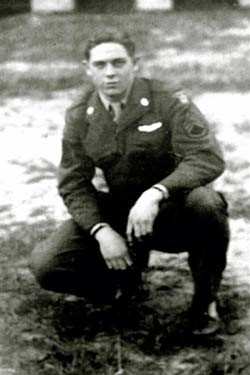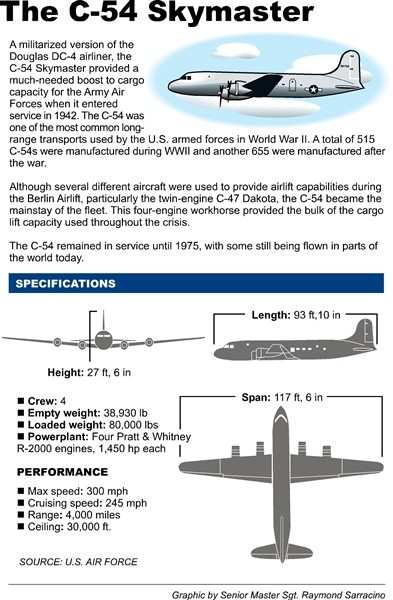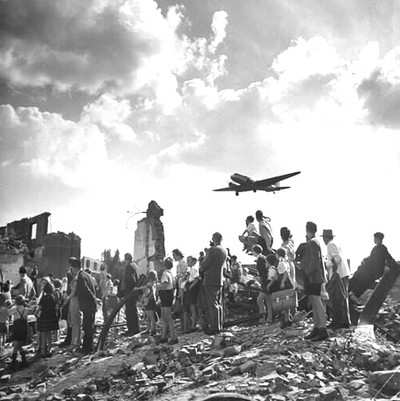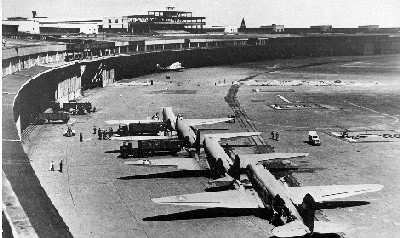Pilot Recalls His Days Flying Coal To Support West Berlin
 For 50 years, Dub Southers recalled the grueling hours he
worked at an air base in northern Germany at the start of the
Berlin Airlift, not the historical significance of what he helped
to achieve as a flight engineer and crew chief.
For 50 years, Dub Southers recalled the grueling hours he
worked at an air base in northern Germany at the start of the
Berlin Airlift, not the historical significance of what he helped
to achieve as a flight engineer and crew chief.
He remembered well the coal being shipped in from local coal
fields, the 196 missions he flew over Berlin and being a
20-year-old Air Force staff sergeant keeping the C-54 Skymaster
aircraft flying.
"Coal was our basic cargo," said Southers (shown at right), now
81 and living in Texas. "Occasionally, we flew flour, but I can't
recall anything other than coal."
It wasn't until 1998 that Southers started really thinking about
the importance of the airlift mission, which lasted from June 1948
to May 1949 and provided vital resources to the German city cut in
half by Soviet rule, he said.
As the anniversary approached, he asked his daughter to search
online for activities happening in Berlin. Her search found the
Berlin Airlift Veterans Association, and he became its
secretary.
He ended up visiting Germany that year for the 50th anniversary,
and he and seven other association members have returned to take
part in 60th anniversary observances.
They will re-enact the first flight of the airlift, he said, and
visit the memorial at Rhein-Main Air Base, get on a C-47 and fly
the corridor from Frankfurt to Templehof Air Base in Berlin, where
there will be another memorial service.
"I was amazed [in 1998] how much progress had been made in the
Western sector of Berlin, and how little had been made in the
Eastern Zone at that time," he said. "By the time I went again in
2004, it was better, though, and quite a bit more had been
done."
In November 1948, Germany was much different. Southers arrived
at Celle Air Base from his duty station at McChord Field, WA as
part of the initial group of airmen sent in for the airlift
mission. The Memphis, TN native said he couldn't believe the amount
of fog that blanketed the area.
"That was really surprising to me," he said. "It was actually a
very nice area. After a few months, when we had enough people, we
were allowed to go off base into the town, where there were
actually some good places to eat and catch a show."
The area hadn't been bombed. "I heard that the British monarchy
actually owned a castle in the area," Southers said, "and they
didn't want that destroyed."
Those short trips to the city were a brief respite from the busy
work hours that dominated Southers' time at Celle Air Base. The
base was located near coal fields, which were connected to the
base. A platform was built right onto the bays along the flightline
so the coal could be stacked and supplied to the aircraft right
away.

The team of airmen was very short of personnel, especially
mechanics, Southers recalled. "When I first got over there, we were
working around the clock, 12 [hours] on, 12 off, seven days a week.
They eventually hired local German aircraft mechanics who worked
alongside us. I remember them being very good, as they were older
and more experienced."
Southers returned to the United States in July 1949. He left the
military after three years, earned a degree in chemical engineering
and settled down with his family. He now works as part-owner of a
small software company.
"I didn't even think about [the Berlin Airlift] much," he said.
"I'm not even sure that my family knew I was involved in it until a
few years before the 50th anniversary. Of course, the history books
didn't have much about it either."
He said by observing the anniversary and remembering the 31
Americans who died in aircraft accidents during the mission,
Americans learn about the importance of the Berlin Airlift.
"At this point, I'm very proud of being a part of it," he said.
"I know that we affected history big-time. We call it the first
victory of the Cold War. Because of the Berlin Airlift, Europe is
free. All of Europe would have ended up communist if we were run
out."
He said during his first return to Germany, Germans actually
approached him with appreciation.
"We were wearing caps that identified us as Berlin Airlift
veterans, and I don't know how many times we were stopped and
thanked for what we did," he said.

He also pointed out that the Air Force today and the way it does
business is shaped by the Berlin Airlift mission.
"The cargo aircraft today was designed based upon lessons we
learned," he said. "At least, that's what they tell us. The
technology has changed, but a lot about the airlift mission today
is based upon what we learned back then."
Today's Air Force senior leaders agree the Berlin Airlift was a
huge moment for the service.
"The Berlin Airlift was a seminal moment for airpower and a
pivotal event in world history," said Gen. Duncan J. McNabb, the
Air Force vice chief of staff, during a recent ceremony honoring
another Berlin Airlift airman, retired Col. Gail Halvorsen, also
known as "the Candy Bomber" for his drops of candy and chocolate
for local children. "It showed the deep compassion of the American
people and sent a message of hope and liberty to Berliners and to
freedom-loving people around the world."
Southers said he does not feel like a hero, despite the pride he
and fellow airmen share about their role in the mission.

"The real heroes were the German people in Berlin who suffered
the things they put up with in the Eastern Zone," he said. "People
just disappeared under the communist rule, because they were
speaking out for freedom. We provided what they needed to get by.
They are the ones who held out and persevered."
(Aero-News salutes Air Force Staff Sgt. Julie Weckerlein,
who serves in the Secretary of the Air Force Public Affairs
Office.)
 ANN's Daily Aero-Linx (04.13.24)
ANN's Daily Aero-Linx (04.13.24) ANN's Daily Aero-Term (04.13.24): Beyond Visual Line Of Sight (BVLOS)
ANN's Daily Aero-Term (04.13.24): Beyond Visual Line Of Sight (BVLOS) Airborne 04.09.24: SnF24!, Piper-DeltaHawk!, Fisher Update, Junkers
Airborne 04.09.24: SnF24!, Piper-DeltaHawk!, Fisher Update, Junkers Aero-News: Quote of the Day (04.14.24)
Aero-News: Quote of the Day (04.14.24) ANN's Daily Aero-Term (04.14.24): Maximum Authorized Altitude
ANN's Daily Aero-Term (04.14.24): Maximum Authorized Altitude






